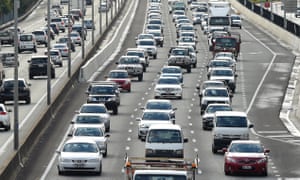Exclusive: An audit shows the drop in carbon pollution was due to a
decline in sales of fuel for light vehicles and domestic aviation
Greenhouse gas emissions
from Australian cars slumped by more than a third and emissions from
aircraft dropped by three-quarters as the country went into partial
lockdown in April, cutting national carbon pollution by about 7% for the
month, an audit has found.
It confirmed that the recession will lead to a notable fall in national emissions this year. But experts believe the drop is likely to be limited and could be short-term given much of the economy – including big industry and manufacturing – has largely continued to operate through the coronavirus pandemic and road transport has begun to increase.
The Australia Institute, which publishes the monthly national energy emissions audit by independent energy analyst Hugh Saddler, said transport emissions are likely to rebound unless the Morrison government releases and backs policies it has promised to support electric vehicles and improve fuel quality.
Saddler, a consultant and honorary associate professor at ANU’s
Crawford School of Public Policy, found transport emissions fell sharply
due to a 36% fall in sales of petrol, liquified petroleum gas (LPG) and
diesel used in light vehicles and a 77% drop in domestic aviation fuel
consumption.It confirmed that the recession will lead to a notable fall in national emissions this year. But experts believe the drop is likely to be limited and could be short-term given much of the economy – including big industry and manufacturing – has largely continued to operate through the coronavirus pandemic and road transport has begun to increase.
The Australia Institute, which publishes the monthly national energy emissions audit by independent energy analyst Hugh Saddler, said transport emissions are likely to rebound unless the Morrison government releases and backs policies it has promised to support electric vehicles and improve fuel quality.
The fall in transport emissions was about 3m tonnes. It is equivalent to about 7% of total monthly national emissions, 5% of annual transport emissions and 0.6% of total annual national emissions.
Emissions from electricity fell another 1.9m tonnes, but Saddler found this was not due to Covid-19. While official data suggests industrial and small business energy use dropped in April and May, household use increased as people stayed home. Saddler said the two changes effectively cancelled each other out, leaving total electricity consumption mostly unchanged, save for a slight fall due to the weather being more mild this year than last.
Where there has been a change is in the mix of types of electricity. The proportion of coal-fired power in the national electricity grid, not counting rooftop solar, fell to 66% – the first time it has fallen below 70% since the introduction of a centralised power supply.
The share of renewable energy grew to about 25%, reflecting the surge of investment in large-scale solar and wind in 2017 and 2018 triggered by the 23% national renewable energy target. Spending on new large-scale renewable energy fell by about 50% last year after that target was met and not renewed.
Saddler said the fall in transport emissions was as extraordinary and historic as the event that caused it. “Obviously that’s completely predictable and expected,” he said.
He said carbon dioxide from cars – the biggest chunk of transport emissions – was likely to rebound as cars returned to roads across most of the country, but it was difficult to assess what impact the greater number of people working from home would have on that.
“It will come back up, but will go back to up to where it was? I’m not sure,” Saddler said.
Richie Merzian, Australia Institute’s climate and energy program director, said data in the report highlighted the reduction in emissions that would possible if governments addressed transport pollution.
He said there was no policy to address emissions from the sector, with a national electric vehicle strategy having been delayed, a liquid fuel security review completed but yet to be released and nothing happening to improve fuel quality.
He said Australia, without an auto-manufacturing industry, was a “car-taker not car-maker” and risked being unprepared if it did not plan as global car companies shifted to electric vehicles.
“Now is the ideal time to drive change in our transport sector by electrifying our cars and buses,” he said. “The federal government could be investing in necessary infrastructure to smooth the inevitable transition away from fossil-fuelled transport, while building the know-how and jobs Australia needs for our electric future.”
Analyses before Covid-19 hit suggested the government was not on track to meet its 2030 emissions reduction target – a 26-28% cut below 2005 levels – without using a carbon accounting loophole. According to revised emissions data, national emissions were down just 1.5% since the Coalition was elected in 2013.
.png)

No comments:
Post a Comment